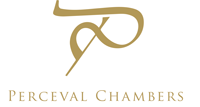If you are a member of the public, a community organisation or a business wishing to obtain advice or representation from a barrister directly, rather than through a solicitor or other intermediary professional, Perceval Chambers may be able to assist you via the direct public access scheme. A number of our barristers are qualified to advise and represent through the scheme, across a wide range of Chambers’ practice areas.
Enquiries about direct public access should be made by emailing us at direct@perevalchambers.com. We will be able to advise on a suitable representative.
What is the direct public access scheme?
The barrister will still carry out all the work that he or she would usually do. This depends very much on the nature of your case, but this will often include advising as to the merits of your case, suggesting what evidence you might consider obtaining to strengthen your case, drafting court documents and representing you in Court or before a Tribunal. Under the direct public access scheme, you take responsibility for the preparatory work that a solicitor would traditionally do, such as gathering evidence, issuing court documents and corresponding directly with the other side.
For further information about the direct public access scheme, have a look at the Bar Standards Board’s Guidance for Lay Clients.
What are the advantages of the direct public access scheme?
As there is no intermediary solicitor, you get a direct line of communication with your barrister. In most cases, instructing a barrister under the direct public access scheme will also save you money as you will be engaging one lawyer, rather than two, and you will be doing yourself many of the straightforward tasks that a solictor would normally charge for, such as writing letters or filling out forms.
Are all cases suitable for direct public access?
Barristers are required to adhere strictly to the Bar Handbook, which at the moment prohibits them from doing tasks that would be classed as ‘litigation’. These prohibited tasks include issuing documents at Court, contacting witnesses, collecting evidence, instructing expert witnesses, and corresponding directly with the other side. We can, however, advise you as to how to do these things yourself, or recommend other professionals who can help you with them.
Some areas of law tend to involve more ‘litigation’ than others, meaning that some types of case lend themselves better than others to the direct public access scheme. Areas of law which in our experience are especially well suited to direct public access include crime (including motoring), regulatory matters, commercial and contractual disputes, employment and discrimination, family, immigration, and property litigation.
If, on reviewing your case, a barrister forms the view that it would be in your best interests to instruct a solicitor, he or she will no longer be able to act for you, other than on the instruction of a solicitor. If this happens, however, the barrister will be happy to suggest to you solicitors specialising in the relevant area of law.
How much will it cost?
Cost will depend on three key factors: the amount of work that needs doing on your case, the complexity of the issues in your case, and the level of experience of the barrister that you choose. We will be will be happy to discuss with you the cost of a particular piece of work.
Can I get Legal Aid?
Barristers cannot take on direct public access work on Legal Aid.
To check your financial eligibility for Legal Aid, you can use the calculator on the Ministry of Justice’s website. Where the merits test is satisfied, you may be able to get legal advice and representation for free or by making contributions, usually monthly. If you are eligible for Legal Aid, you should think carefully before instructing a barrister privately through the direct public access scheme.
However, we recognise that more and more types of case are being excluded from the scope of Legal Aid funding, and that it is therefore becoming increasingly difficult for many people to secure access to justice. In suitable cases, direct public access offers a cost-effective way of securing advice and representation.
What about Conditional Fee Agreements (‘no win, no fee’)?
Most barristers will not be able to accept instructions on a Conditional Fee (‘no win, no fee’) basis. This is because we usually require payment in advance, and fees under this sort of agreement cannot be paid until the case has finished.
How do I choose a barrister?
Perceval chambers barristers are accredited to accept instructions on a direct public access basis are listed below. Clicking on any of the names in the list will take you to that barrister’s individual profile, which will include information about that particular barrister’s experience and areas of expertise.
We may be able to assist you on a direct access basis and are always happy to be approached to discuss what is best for you. Please contact us for further information.
- Telephone: 020 3078 6880
- Fax: 020 3008 8451
- Email: clerks@percevalchambers.com or fill out our enquiry form here.
